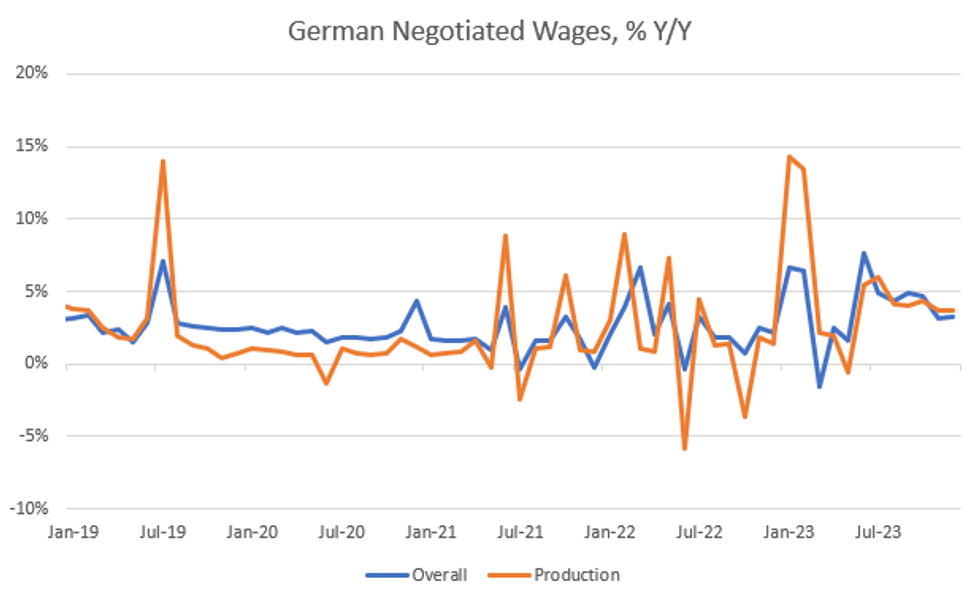-
Policy
Policy
Exclusive interviews with leading policymakers that convey the true policy message that impacts markets.
LATEST FROM POLICY: -
EM Policy
EM Policy
Exclusive interviews with leading policymakers that convey the true policy message that impacts markets.
LATEST FROM EM POLICY: -
G10 Markets
G10 Markets
Real-time insight on key fixed income and fx markets.
Launch MNI PodcastsFixed IncomeFI Markets AnalysisCentral Bank PreviewsFI PiFixed Income Technical AnalysisUS$ Credit Supply PipelineGilt Week AheadGlobal IssuanceEurozoneUKUSDeep DiveGlobal Issuance CalendarsEZ/UK Bond Auction CalendarEZ/UK T-bill Auction CalendarUS Treasury Auction CalendarPolitical RiskMNI Political Risk AnalysisMNI Political Risk - US Daily BriefMNI Political Risk - The week AheadElection Previews -
Emerging Markets
Emerging Markets
Real-time insight of emerging markets in CEMEA, Asia and LatAm region
-
Commodities
-
Credit
Credit
Real time insight of credit markets
-
Data
-
Global Macro
Global Macro
Actionable insight on monetary policy, balance sheet and inflation with focus on global issuance. Analysis on key political risk impacting the global markets.
Global MacroDM Central Bank PreviewsDM Central Bank ReviewsEM Central Bank PreviewsEM Central Bank ReviewsBalance Sheet AnalysisData AnalysisEurozone DataUK DataUS DataAPAC DataInflation InsightEmployment InsightGlobal IssuanceEurozoneUKUSDeep DiveGlobal Issuance Calendars EZ/UK Bond Auction Calendar EZ/UK T-bill Auction Calendar US Treasury Auction Calendar Global Macro Weekly -
About Us
To read the full story
Sign up now for free trial access to this content.
Please enter your details below.
Why MNI
MNI is the leading provider
of intelligence and analysis on the Global Fixed Income, Foreign Exchange and Energy markets. We use an innovative combination of real-time analysis, deep fundamental research and journalism to provide unique and actionable insights for traders and investors. Our "All signal, no noise" approach drives an intelligence service that is succinct and timely, which is highly regarded by our time constrained client base.Our Head Office is in London with offices in Chicago, Washington and Beijing, as well as an on the ground presence in other major financial centres across the world.
Real-time Actionable Insight
Get the latest on Central Bank Policy and FX & FI Markets to help inform both your strategic and tactical decision-making.
Free AccessPotential For Negotiated Wage Growth Upside In Early 2024
German negotiated wages rose by +3.29% Y/Y overall in December (vs +3.15% Nov), including an increase of +3.70% in the production sector (vs +3.71% prior), per Bundesbank data.
- Negotiated wages apply to approximately 43% of all German employees, according to the Bundesbank, so are closely watched for developments in overall wage pressures. It rounds out the national estimates of negotiated wages for Q4 2023 ahead of the quarterly Eurozone-wide estimate expected to be released on Tuesday.
- Even with the slight Y/Y uptick, overall German wage growth continues to show evidence of recent deceleration (as recently as October it printed +4.64%).
- Wage growth in the production sector came in at the lowest rate since May 2023. The implication is that December's overall uptick seems to be have been driven by the services sector.
- Wage pressures are considered to be one of the main obstacles to ECB rate cuts, as mentioned by a multitude of ECB policymakers recently, particularly in the light of weak Eurozone productivity data. German employee compensation makes up around 1/3 of the Eurozone total.
- Looking ahead, regardless of the labour market softening, German negotiated wage growth is expected to tick up over the coming months, with particular upside potential in March when many agreements are being negotiated, driven by agreement expirations in the construction industry.
- Additionally, an E1,800 "inflation compensation" one-off payment to state public workers and servants, agreed in December and affecting more than 5% of employed persons in Germany, will only be recognized in Q1 2024, which will also push up wage growth in the quarter, as one-off payments are included in the Bundesbank's tracker.
- MNI has previously noted that the private sector German labour market softened considerably in the second half of 2023 (see 'Higher Services-Driven Employment Levelled By Lower Hours Per Person', Feb 16), particularly in manufacturing. This might put some downside pressure on the negotiation leverage of the worker unions going ahead.
 MNI, Bundesbank
MNI, Bundesbank
To read the full story
Sign up now for free trial access to this content.
Please enter your details below.
Why MNI
MNI is the leading provider
of intelligence and analysis on the Global Fixed Income, Foreign Exchange and Energy markets. We use an innovative combination of real-time analysis, deep fundamental research and journalism to provide unique and actionable insights for traders and investors. Our "All signal, no noise" approach drives an intelligence service that is succinct and timely, which is highly regarded by our time constrained client base.Our Head Office is in London with offices in Chicago, Washington and Beijing, as well as an on the ground presence in other major financial centres across the world.
